七年级下>Module 11 Body language>Unit 2 Here are some ways to welcome them
文档属性
| 名称 | 七年级下>Module 11 Body language>Unit 2 Here are some ways to welcome them |  | |
| 格式 | zip | ||
| 文件大小 | 5.4MB | ||
| 资源类型 | 教案 | ||
| 版本资源 | 外研版 | ||
| 科目 | 英语 | ||
| 更新时间 | 2013-05-30 11:04:51 | ||
图片预览


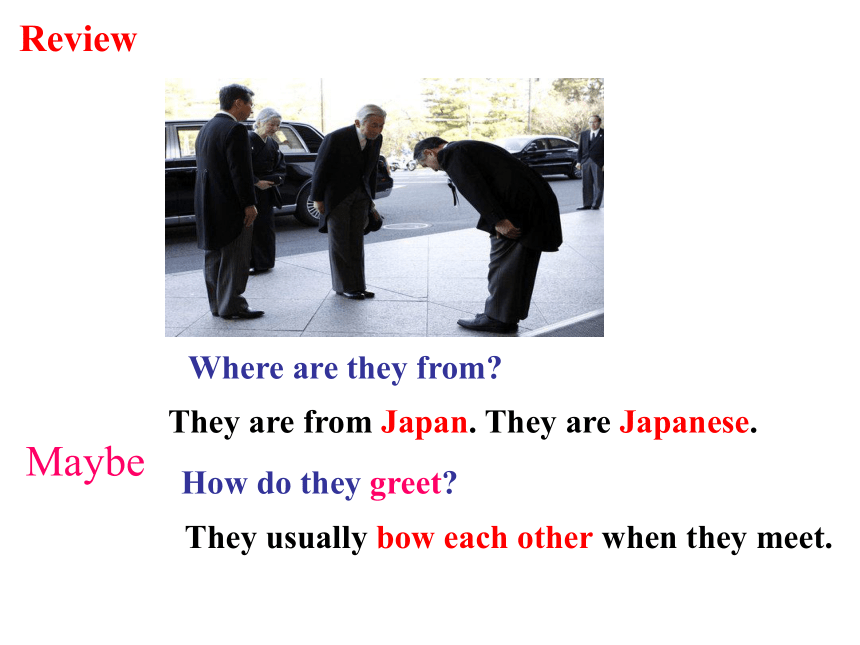
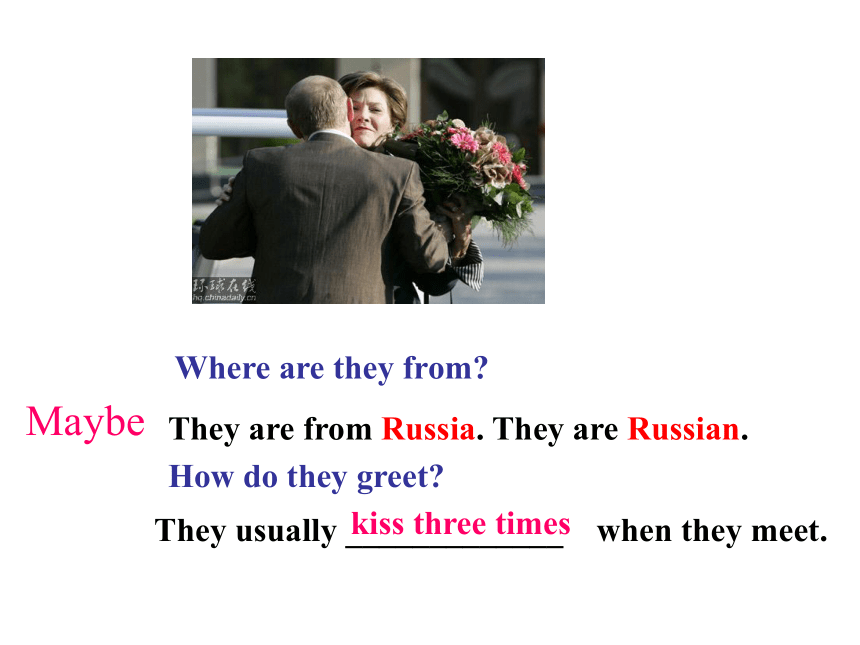
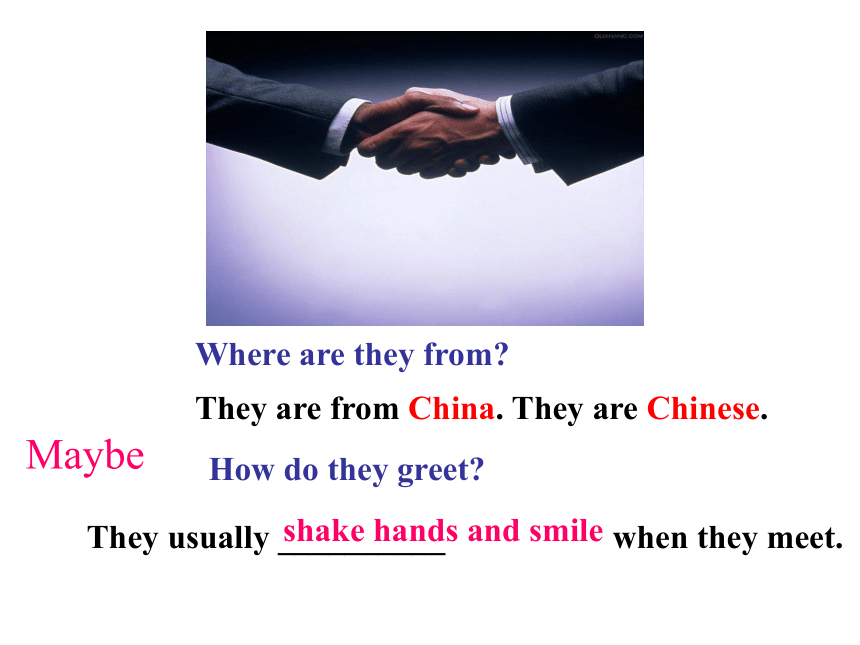
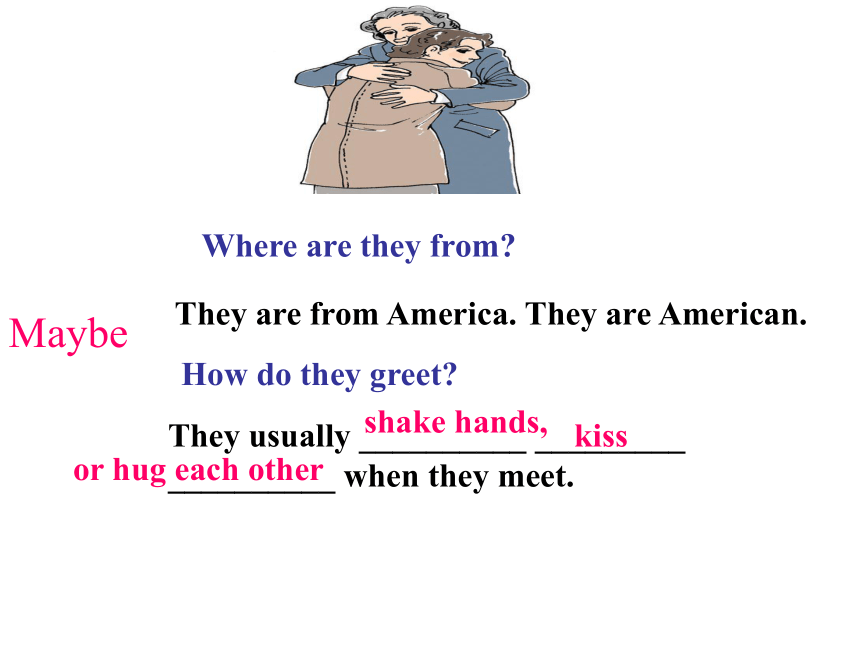

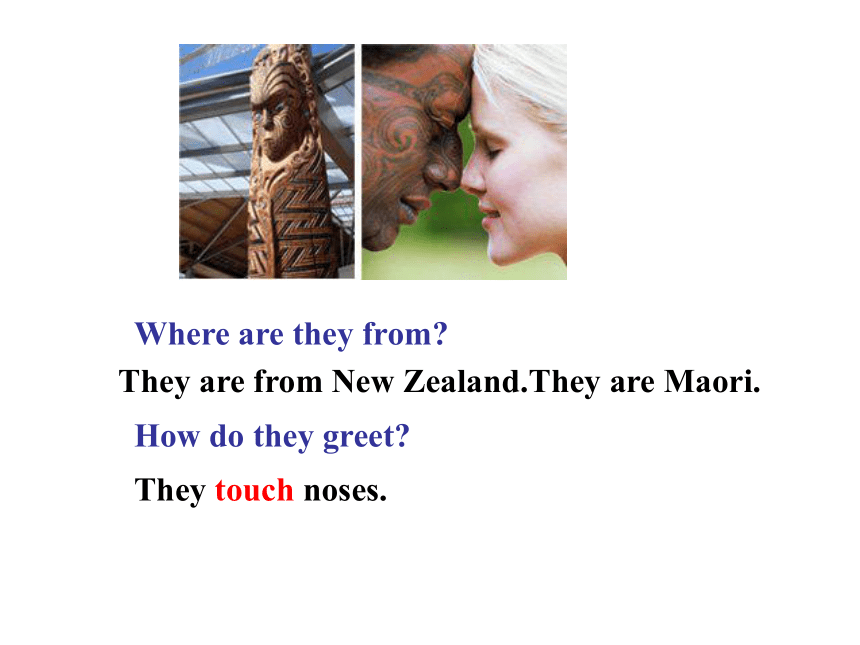
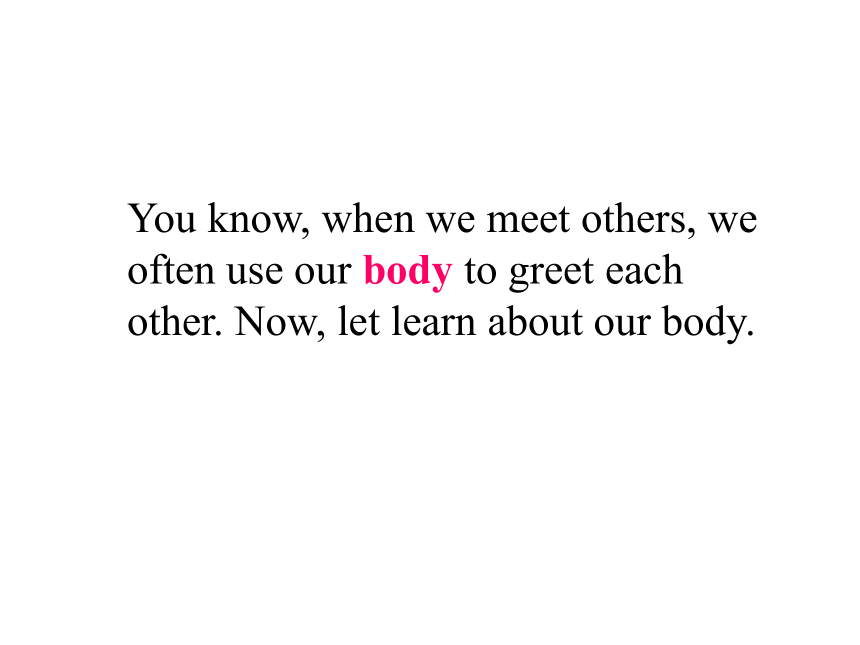

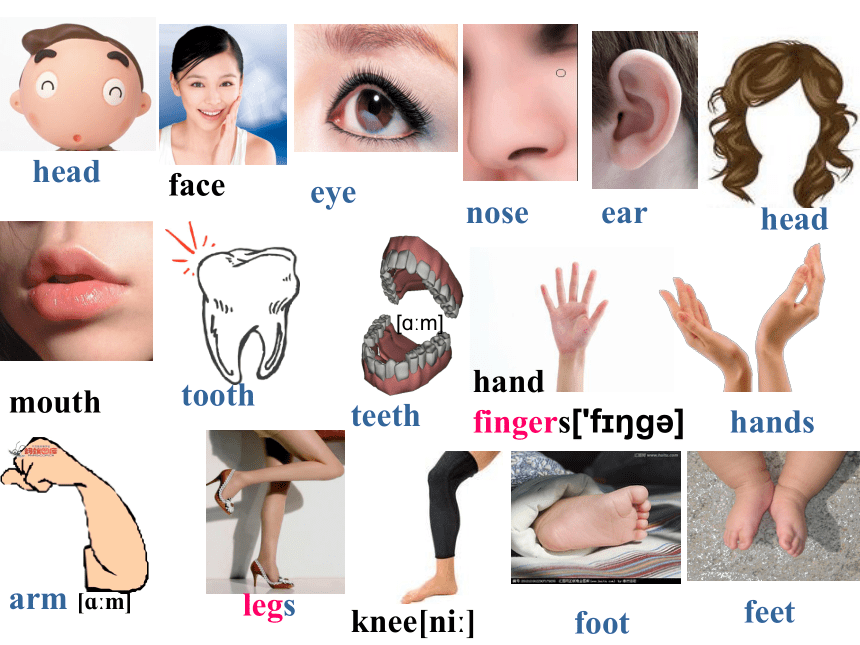
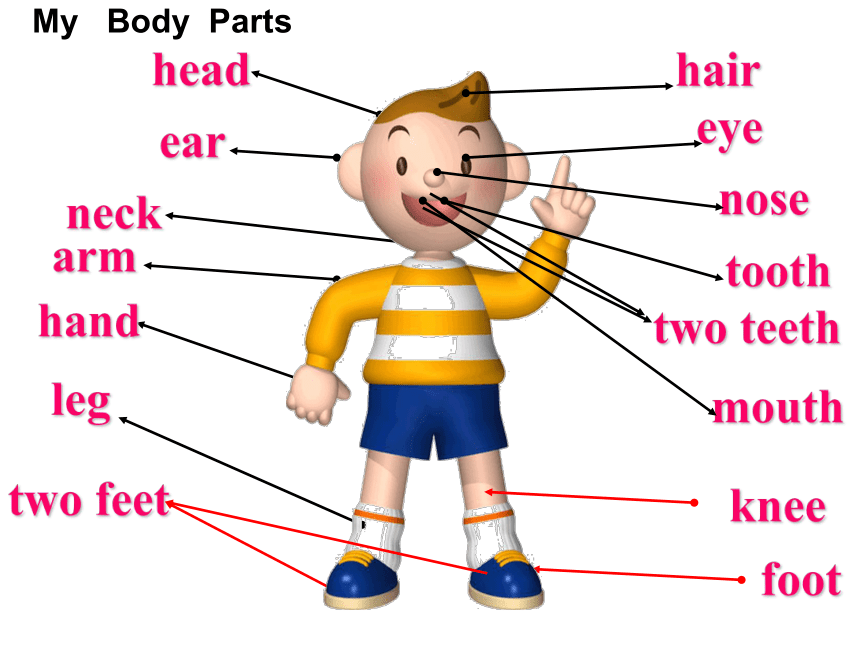
文档简介
课件42张PPT。Module 11
Body language Unit 2
Here are some ways to welcome them.俄罗斯老师
迎接游客
在俄罗斯
握手
见来访者
点头Russian teachers
welcome the visitors
in Russia
shake hands
meet visitors
nod one’s head在不同国家
在美国
把手合拢
碰鼻子
那是因为in different countries
in the US
put their hands together
touch noses
that’s becauseWhere are they from?They are from Japan. They are Japanese.MaybeThey usually bow each other when they meet.ReviewHow do they greet?They are from Russia. They are Russian.They usually _____________ when they meet.Where are they from?How do they greet?Maybekiss three timesThey are from China. They are Chinese.They usually __________ when they meet.Where are they from?How do they greet?Maybeshake hands and smileThey are from America. They are American.They usually __________ _________ __________ when they meet.Where are they from?How do they greet?Maybeshake hands,kissor hug each otherShe is from India. She is Indian.They usually ____________________ and ________________ when they meet.Where is she from?How do Indian people greet?Maybeput their hands togethernod their headsThey are from New Zealand.They are Maori.They touch noses.Where are they from?How do they greet?You know, when we meet others, we often use our body to greet each other. Now, let learn about our body.Can you say the part of your body?headfaceeyenoseheadmouthtoothteethhand fingers['f??g?] handsarm [ɑ?m] legs[ɑ?m] knee[ni?] footfeetearheadeararmhandlegfooteyenosetoothmouthtwo feettwo teethMy Body Partsneckhairkneeeyefingerfootkneelegmouth1 Match the words with the parts of the body.Now, let’s play a game!Touch your …..Body language in our life.say “ good”walk arm in armsay “ yes”say “ ok”wave to say goodbyewave to say helloIn many countries, it’s polite to wave to say goodbye or hello.But in Greece, it’s not at all polite. In fact, it’s very rude.rude=not politefinger['f??g?]
foot[f?t]
knee[ni?]
leg[leg]
mouth[ma?θ]
body['b?d?]
foreign['f?r?n]
North American[n?:θ]
personal ['p? ?sn?l]
arm[ɑ?m]
arm in arm
South American[sa?θ]
hold[h??ld] n. 手指
n. (pl. feet[fi?t] ) 脚,足
n. 膝盖
n. 腿
n. 嘴,口
n. 身体,躯干
adj. 外国的
北美人
adj. 个人的
n. 臂;手臂
臂挽臂地
南美人
v. (held[held] ) 握着;使不动New wordsmove[mu?v]
Britain['br?tn]
not at all
polite[p?'la?t]
somewhere['s?mwe?]
wave[we?v]
fact[f?kt]
in fact
rude[ru?d] v. 移动
不列颠;英国
一点也不
adj. 礼貌的
adv. 某处;某个地方
v. 挥(手);招(手);摆(手)
n. 事实;细节
事实上
adj. 粗鲁的;无礼的ReadingStep1 Fast reading to find key sentence for each paragraphHow close do you stand when you talk to friend? You can stand close to people in the Middle East but don’t stand too close to North Americans! Give them more personal space.Key sentencesP1 P2 P3 P4 P5 How close do you stand when you talk a friend?How about touching people?Do you look at people when you talk?How do you say goodbye?Here are some ways to welcome them.What’s the main idea of the passage?3 Check ( ) the body language you can
use in different countries and places. Is body language the same in different
countries?
No, it isn’t .
2. Is it all right to stand close to people in
the Middle East?
Yes, it is.Now, listen to the tape to answer the questions.3. Do the British like touching people?
No, they don’t.
4. Do Americans look at people when they
talk?
Yes, they do.
5. Do people in Greece wave goodbye?
No, they don’t. Reading time.Language pointsOur new foreign students are going to arrive very soon, and here are some ways to welcome them.around the world
foreign students
very soon
some ways to welcome them全世界
外国学生
很快
一些欢迎他们的方式arrivein+大地点at +小地点Body language around the worldHow close do you stand when you talk to friend? You can stand close to people in the Middle East but don’t stand too close to North Americans! Give them more personal space.talk to/with sb
close to
in the Middle East
North Americans
personal space与某人交谈
靠近
在中东
北美人
个人空间talk about sth
谈论某事How about touching people? Chinese girls often walk arm in arm with their friends. South Americans sometimes hold your arm when they talk to you, so you can’t move away! But in Britain many people don’t like other people to touch them at all.How about sth/doing sth?=What about..?
arm in arm
South Americans
hold one’s arm
move away
not at all…怎么样?
臂挽臂地
南美人
抓住某人的手臂
移开
一点也不Do you look at people when you talk? In some places, it isn’t polite to look at people when you talk, but in other countries it isn’t polite to look somewhere else. In Britain and the US, people usually look at each other when they talk.look at
in other countries
somewhere else
look at each other看
在其他国家
其他某个地方
看着对方it isn’t polite to look at people when you talk
交谈时看着对方是不礼貌的
It is adj for sb to do sth.And how do you say goodbye? That’s easy, wave to say goodbye. But be careful! In Greece, it’s not at all polite! In fact, it’s very rude.说 “再见”
那很简单
挥手告别
小心
事实上say goodbye
that’s easy
wave to say goodbye
be careful
in fact全世界
外国学生
很快
一些欢迎他们的方式
与某人交谈
靠近
在中东
北美人
个人空间
…怎么样?
臂挽臂地
南美人
抓住某人的手臂
移开
一点也不around the world
foreign students
very soon
some ways to welcome them
talk to/with sb
close to
in the Middle East
North Americans
personal space
How about sth/doing sth?=What about..?
arm in arm
South Americans
hold one’s arm
move away
not at all词组回顾看
在其他国家
其他某个地方
看着对方
说 “再见”
那很简单
挥手告别
小心
事实上look at
in other countries
somewhere else
look at each other
say goodbye
that’s easy
wave to say goodbye
be careful
in fact4 Complete the passage with the words
from the box. (group work)Lingling: People from (1) ________
countries have different body
language from us. In (2)
________ people don’t like to Britain, fact, foreign, hold, move
personal, polite, rude, someone, waveforeignBritain touch other people, but in South America they like to (3) _______ on to you so you can’t (4) _______ away. Remember to give (5) __________ from North America lots of (6) _________ space. In some countries it isn’t (7) _______ to look at people when you talk. And it isn’t polite to (8) ______ goodbye in Greece. In (9) _______, it’s quite (10) _______!holdmovesomeonepersonalpolitewavefactrudeWriting5 Work in groups. Talk about your class
rules.— Shall we stand up when we answer a
question in class?
— Yes, we shall.6 Make a list of class rules for new
students in your school.Stand up when you answer a question in class.
Don’t be late for class.
Be polite to the teacher.
Don’t eat food in class.
…ExerciseIndividual activity请点击图标,获取word链接根据英文解释,指出下列各个身体部位。
the long thin parts on your hand
the part of your face which you put food into, or which you use for speaking
the part of your face that you smell with and breathe (呼吸) through fingersmouthnose4. the part of your body that you stand
on and walk on
5. either of the two long parts of your
body that your feet are joined to
6. the joint (关节、结合处) that bends in
the middle of your leg
7. one of the two long parts of your body
between your shoulders and your
hands footlegskneearmII. 按照句子意思,填入恰当的词。 How many f________ languages can
you speak?
2. Your feelings about him is very
__________ (person). We cannot trust
your words.
3. I cannot find my glasses. I must put it
_____________ (某个地方).foreignpersonalsomewhere4. We Chinese like to ______ (wave) to say
goodbye.
5. When we arrived there, he was
__________ (hold) a knife in his hand.
6. You should be ________ (有礼貌的) to
the older.
7. I didn’t mean to be _______ (失礼的),
but I have to leave early.waveholdingpoliterude8. — Do you like the Japanese food?
— _______________. (一点也不)
9. They are very good friends. They
always walk _______________ (臂挽臂
地) when they are together.
10. You know what? ____________ (事实
上), you are right. I need to drop the
idea at once.Not at allarm in armIn factHomeworkHomework (1) Module 11 Unit 2
Read the text three times.
Make a list of class rules.Thank you.
Body language Unit 2
Here are some ways to welcome them.俄罗斯老师
迎接游客
在俄罗斯
握手
见来访者
点头Russian teachers
welcome the visitors
in Russia
shake hands
meet visitors
nod one’s head在不同国家
在美国
把手合拢
碰鼻子
那是因为in different countries
in the US
put their hands together
touch noses
that’s becauseWhere are they from?They are from Japan. They are Japanese.MaybeThey usually bow each other when they meet.ReviewHow do they greet?They are from Russia. They are Russian.They usually _____________ when they meet.Where are they from?How do they greet?Maybekiss three timesThey are from China. They are Chinese.They usually __________ when they meet.Where are they from?How do they greet?Maybeshake hands and smileThey are from America. They are American.They usually __________ _________ __________ when they meet.Where are they from?How do they greet?Maybeshake hands,kissor hug each otherShe is from India. She is Indian.They usually ____________________ and ________________ when they meet.Where is she from?How do Indian people greet?Maybeput their hands togethernod their headsThey are from New Zealand.They are Maori.They touch noses.Where are they from?How do they greet?You know, when we meet others, we often use our body to greet each other. Now, let learn about our body.Can you say the part of your body?headfaceeyenoseheadmouthtoothteethhand fingers['f??g?] handsarm [ɑ?m] legs[ɑ?m] knee[ni?] footfeetearheadeararmhandlegfooteyenosetoothmouthtwo feettwo teethMy Body Partsneckhairkneeeyefingerfootkneelegmouth1 Match the words with the parts of the body.Now, let’s play a game!Touch your …..Body language in our life.say “ good”walk arm in armsay “ yes”say “ ok”wave to say goodbyewave to say helloIn many countries, it’s polite to wave to say goodbye or hello.But in Greece, it’s not at all polite. In fact, it’s very rude.rude=not politefinger['f??g?]
foot[f?t]
knee[ni?]
leg[leg]
mouth[ma?θ]
body['b?d?]
foreign['f?r?n]
North American[n?:θ]
personal ['p? ?sn?l]
arm[ɑ?m]
arm in arm
South American[sa?θ]
hold[h??ld] n. 手指
n. (pl. feet[fi?t] ) 脚,足
n. 膝盖
n. 腿
n. 嘴,口
n. 身体,躯干
adj. 外国的
北美人
adj. 个人的
n. 臂;手臂
臂挽臂地
南美人
v. (held[held] ) 握着;使不动New wordsmove[mu?v]
Britain['br?tn]
not at all
polite[p?'la?t]
somewhere['s?mwe?]
wave[we?v]
fact[f?kt]
in fact
rude[ru?d] v. 移动
不列颠;英国
一点也不
adj. 礼貌的
adv. 某处;某个地方
v. 挥(手);招(手);摆(手)
n. 事实;细节
事实上
adj. 粗鲁的;无礼的ReadingStep1 Fast reading to find key sentence for each paragraphHow close do you stand when you talk to friend? You can stand close to people in the Middle East but don’t stand too close to North Americans! Give them more personal space.Key sentencesP1 P2 P3 P4 P5 How close do you stand when you talk a friend?How about touching people?Do you look at people when you talk?How do you say goodbye?Here are some ways to welcome them.What’s the main idea of the passage?3 Check ( ) the body language you can
use in different countries and places. Is body language the same in different
countries?
No, it isn’t .
2. Is it all right to stand close to people in
the Middle East?
Yes, it is.Now, listen to the tape to answer the questions.3. Do the British like touching people?
No, they don’t.
4. Do Americans look at people when they
talk?
Yes, they do.
5. Do people in Greece wave goodbye?
No, they don’t. Reading time.Language pointsOur new foreign students are going to arrive very soon, and here are some ways to welcome them.around the world
foreign students
very soon
some ways to welcome them全世界
外国学生
很快
一些欢迎他们的方式arrivein+大地点at +小地点Body language around the worldHow close do you stand when you talk to friend? You can stand close to people in the Middle East but don’t stand too close to North Americans! Give them more personal space.talk to/with sb
close to
in the Middle East
North Americans
personal space与某人交谈
靠近
在中东
北美人
个人空间talk about sth
谈论某事How about touching people? Chinese girls often walk arm in arm with their friends. South Americans sometimes hold your arm when they talk to you, so you can’t move away! But in Britain many people don’t like other people to touch them at all.How about sth/doing sth?=What about..?
arm in arm
South Americans
hold one’s arm
move away
not at all…怎么样?
臂挽臂地
南美人
抓住某人的手臂
移开
一点也不Do you look at people when you talk? In some places, it isn’t polite to look at people when you talk, but in other countries it isn’t polite to look somewhere else. In Britain and the US, people usually look at each other when they talk.look at
in other countries
somewhere else
look at each other看
在其他国家
其他某个地方
看着对方it isn’t polite to look at people when you talk
交谈时看着对方是不礼貌的
It is adj for sb to do sth.And how do you say goodbye? That’s easy, wave to say goodbye. But be careful! In Greece, it’s not at all polite! In fact, it’s very rude.说 “再见”
那很简单
挥手告别
小心
事实上say goodbye
that’s easy
wave to say goodbye
be careful
in fact全世界
外国学生
很快
一些欢迎他们的方式
与某人交谈
靠近
在中东
北美人
个人空间
…怎么样?
臂挽臂地
南美人
抓住某人的手臂
移开
一点也不around the world
foreign students
very soon
some ways to welcome them
talk to/with sb
close to
in the Middle East
North Americans
personal space
How about sth/doing sth?=What about..?
arm in arm
South Americans
hold one’s arm
move away
not at all词组回顾看
在其他国家
其他某个地方
看着对方
说 “再见”
那很简单
挥手告别
小心
事实上look at
in other countries
somewhere else
look at each other
say goodbye
that’s easy
wave to say goodbye
be careful
in fact4 Complete the passage with the words
from the box. (group work)Lingling: People from (1) ________
countries have different body
language from us. In (2)
________ people don’t like to Britain, fact, foreign, hold, move
personal, polite, rude, someone, waveforeignBritain touch other people, but in South America they like to (3) _______ on to you so you can’t (4) _______ away. Remember to give (5) __________ from North America lots of (6) _________ space. In some countries it isn’t (7) _______ to look at people when you talk. And it isn’t polite to (8) ______ goodbye in Greece. In (9) _______, it’s quite (10) _______!holdmovesomeonepersonalpolitewavefactrudeWriting5 Work in groups. Talk about your class
rules.— Shall we stand up when we answer a
question in class?
— Yes, we shall.6 Make a list of class rules for new
students in your school.Stand up when you answer a question in class.
Don’t be late for class.
Be polite to the teacher.
Don’t eat food in class.
…ExerciseIndividual activity请点击图标,获取word链接根据英文解释,指出下列各个身体部位。
the long thin parts on your hand
the part of your face which you put food into, or which you use for speaking
the part of your face that you smell with and breathe (呼吸) through fingersmouthnose4. the part of your body that you stand
on and walk on
5. either of the two long parts of your
body that your feet are joined to
6. the joint (关节、结合处) that bends in
the middle of your leg
7. one of the two long parts of your body
between your shoulders and your
hands footlegskneearmII. 按照句子意思,填入恰当的词。 How many f________ languages can
you speak?
2. Your feelings about him is very
__________ (person). We cannot trust
your words.
3. I cannot find my glasses. I must put it
_____________ (某个地方).foreignpersonalsomewhere4. We Chinese like to ______ (wave) to say
goodbye.
5. When we arrived there, he was
__________ (hold) a knife in his hand.
6. You should be ________ (有礼貌的) to
the older.
7. I didn’t mean to be _______ (失礼的),
but I have to leave early.waveholdingpoliterude8. — Do you like the Japanese food?
— _______________. (一点也不)
9. They are very good friends. They
always walk _______________ (臂挽臂
地) when they are together.
10. You know what? ____________ (事实
上), you are right. I need to drop the
idea at once.Not at allarm in armIn factHomeworkHomework (1) Module 11 Unit 2
Read the text three times.
Make a list of class rules.Thank you.
同课章节目录
- Module 1 Lost and found
- Unit 1 Whose bag is this?
- Unit 2 Are they yours?
- Unit 3 Language in use
- Module 2 What can you do ?
- Unit 1 I can play the piano
- Unit 2 I can run really fast
- Unit 3 Language in use
- Module 3 Making plans
- Unit 1 What are you going to do at the weekends?
- Unit 2 We're going to cheer the players.
- Unit 3 Language in use
- Module 4 Life in the future
- Unit 1 Everyone will study at home
- Unit 2 Every family will have a small plane.
- Unit 3 Language in use
- Module 5 Shopping
- Unit 1 What can I do for you?
- Unit 2 You can buy everything on the Internet
- Unit 3 Language in use
- Module 6 Around town
- Unit 1 Could you tell me how to get to the Nationa
- Unit 2 The London Eye is on your right.
- Unit 3 Language in use
- Revision module A
- Module 7 My past life
- Unit 1 I was born in a small village.
- Unit 2 I was born in Quincy.
- Unit 3 Language in use
- Module 8 Story time
- Unit 1 Once upon a time….
- Unit 2 Goldilocks hurried out of the house.
- Unit 3 Language in use
- Module 9 Life history
- Unit 1 He left school and began work at the age of
- Unit 2 He decided to be an actor.
- Unit 3 Language in use
- Module 10 A holiday journey
- Unit 1 What did you do?
- Unit 2 This morning we took a walk.
- Unit 3 Language in use
- Module 11 Body language
- Unit 1 They touch noses!
- Unit 2 Here are some ways to welcome them.
- Unit 3 Language in use
- Module 12 Western music
- Unit 1 It's so beautiful!
- Unit 2 Vienna is the centre of European classical
- Unit 3 Language in use
- Revision module B
